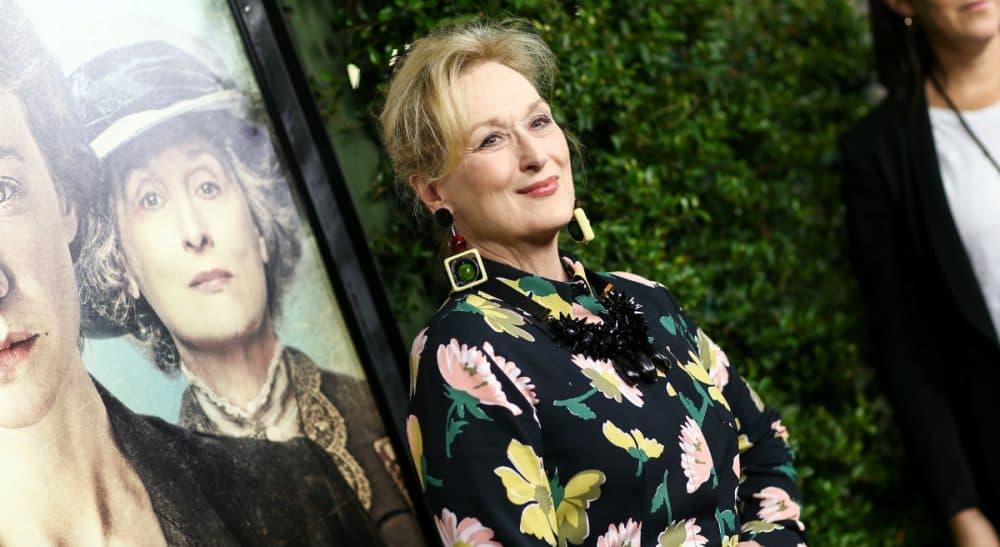Advertisement
Meryl Streep's T-Shirt Is Not The Issue

I’ve been thinking a lot — and with my usual ambivalence — about the recent Internet “scandal” regarding Meryl Streep’s T-shirt.
In case you missed it, Streep and two costars were interviewed in the London edition of Time Out magazine to promote their new movie, "Suffragette." In the film, Streep portrays Emmeline Pankhurst, the feminist activist who declared in 1913, “I know that women, once convinced that they are doing what is right, that their rebellion is just, will go on, no matter what the difficulties, no matter what the dangers, so long as there is a woman alive to hold up the flag of rebellion. I would rather be a rebel than a slave.” That last phrase, “I would rather be a rebel than a slave,” was emblazoned on a T-shirt that Streep wore on the magazine’s cover.
We have to learn from the past, and can’t if we rewrite it to conform to today’s sensibilities.
The social media response was immediate and, by and large, outraged. Some tweeters seemed to be unaware that the film and quote were referring to the British women’s suffrage movement, not alluding to the American Civil War. Others, while understanding the context, nonetheless charged Time Out, Streep and the "Suffragette" publicity team with being tone-deaf, oblivious or deliberately obfuscating the racist, exclusionary nature of the suffrage movement in both the U.K. and the U.S. And in the wake of that reaction, still others charged those who took umbrage at the T-shirt as being ignorant or overly sensitive.
Some view the T-shirt controversy as an indictment of political correctness. Some, like me, initially saw it as a narrow, misguided appropriation of generic terms like “slave” and “rebel.” But the sin of "Suffragette," according to blogger Shayan Farooq, is that it tries to outrun or deny both Pankhurst’s personal and her movement’s collective history. In celebrating the struggle of white English feminists, she argues that the film ignores not just the role played by women of color (primarily from India), but implicitly endorses Pankhurst’s willingness to give primacy to women’s suffrage over black emancipation.
Check out #Suffragette Meryl Streep and Carey Mulligan talking about feminism @TimeOutLondon http://t.co/4DfMLRiMLL pic.twitter.com/yASP0lUByT
— Curzon Cinemas (@CurzonCinemas) September 30, 2015Farooq may be conflating English and American history. Though Pankhurst was indeed a defender of colonialism (becoming downright reactionary by the end of her life), unlike the Americans, the British abolished the slave trade in 1807, over a century before they granted women the right to vote. It was some 19th and early 20th Century American feminists who were far more deserving of condemnation. Some opposed the 15th Amendment (which prohibits the denial of suffrage because of race) because it did not also prohibit sex discrimination. Indeed, some actively played to racist beliefs, arguing that enfranchising women was the only way to counter the effects of enfranchising black men.
This rift between abolitionists and suffragists who had, prior to the Civil War, been in most cases one and the same people, was a triumph of the divide and conquer strategy. That’s why though I quibble with her interpretation of the facts, I agree with Farooq, Gloria Steinem and others in their argument for an “intersectional” approach to political struggle, one that acknowledges the relationship between multiple demographic aspects of identity, including class, race and sexual orientation.
what bothers me ... are the charges of one or another party being 'tone deaf' ... when I hear that term in this context I start expecting the speaker to demand a rewrite of 'Huckleberry Finn' or 'Uncle Tom’s Cabin'...
But what bothers me in this, as in so many recent political debates, are the charges of one or another party being “tone deaf.” Perhaps unfairly, when I hear that term in this context I start expecting the speaker to demand a rewrite of "Huckleberry Finn" or "Uncle Tom’s Cabin," books with language and even portrayals that are cringe-worthy by today’s standards, but that both revealed and transformed the ethos of their times.
I subscribe to the “political correctness” that deems it socially unacceptable to perpetuate racist, sexist or other derogatory beliefs and language in describing others. I don’t defend the “right” to hate speech. But I do think it’s critical that we look beyond language to intent, especially when studying history. Were the British suffragettes guilty of hyperbole in comparing themselves to slaves? Yes … but not without grounds. They were living in a time when a married couple was not a partnership of two individuals, but a single entity, one represented by the husband. For a woman, getting married meant losing her right to her children, her body, her income and all of her physical property except land.
Advertisement
We have to learn from the past, and can’t if we rewrite it to conform to today’s sensibilities. So let’s worry a little less about tone-deafness. Old slogans may be jarring to today’s ears, but if it takes some dissonance to provoke thoughtful debate, I think we and the Internet can handle it.
Monday, Oct. 26, 2015 at 1:05 p.m.
Update from the author: Response to this post (some of it offline) has been immediate and persuasive. Call me a flip-flopper (which beneficently interpreted can just mean that I learn from the feedback of others), but I now think I was wrong in making light of "tone deafness." In an ideal world, slogans wouldn't be evaluated independent of their context. But in the real world, one line on the cover of an entertainment magazine is often our only shot at conveying meaning, so contrary to what I wrote above, I've now come to agree that a well-respected white American wearing a t-shirt saying "I'd rather be a rebel than a slave" is needlessly inflammatory. Good call, Internet.
-- J.W.S.
This article was originally published on October 26, 2015.
